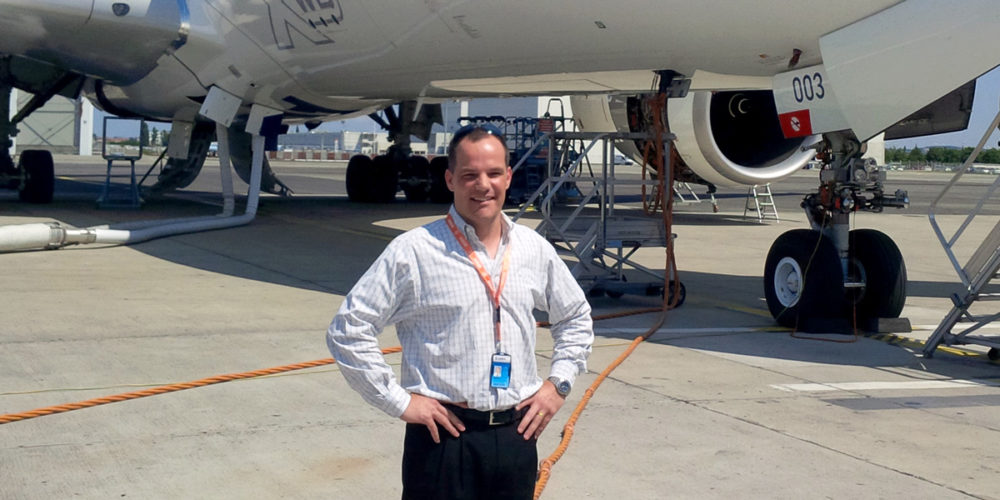As a student and later as a flight instructor, David Zwegers (’98, ’10, DB) never imagined someday he would oversee flight safety for 15 territories and more than 30 countries.
“This is my dream job because I get to be a part of making this whole industry safer on a scale I never thought possible before,” says Zwegers, who is the regional safety director for Latin America and the Caribbean for Airbus.
Based in Miami, Zwegers works with 29 airlines that operate Airbus aircraft across the region. He helps them improve their operational safety while working with a host of civil aviation authorities and industry organizations. Headquartered in Toulouse, France, Airbus is a division of the multinational Airbus Group SE that manufactures civil aircraft.
With almost 650 Airbus aircraft in operation in his region and nearly 450 yet to deliver, Zwegers’ job is complex and it involves lots of travel. Last year he was away from home for 150 nights.
“I think the biggest challenge to safety is the rapid evolution of the aviation industry,” he says. “You constantly have to adapt to new business models, regulations, technologies and safety concepts.”
While challenging, Zwegers says knowing that his work saves lives is rewarding beyond measure — and it all started at Embry-Riddle.
European Roots
Born in the Netherlands, Zwegers’ father traveled a lot for business, and the family moved to southern Spain when he was 4 years old. Zwegers was introduced to aviation at an early age, flying frequently with his family to visit relatives in the Netherlands.
“For as long as I can remember, I have always wanted to be a pilot,” he says.
The high cost of flight training in Europe initially dissuaded Zwegers from pursuing a flying career. To his delight, he discovered flight training was more affordable in the United States, when he moved in 1994 with his family to Clearwater, Fla.
With a bachelor’s degree in aeronautical science from Embry-Riddle in hand, Zwegers became a flight instructor and training manager for the Daytona Beach Campus’ flight department. He later spent two years training Air Force cadets in Colorado Springs, Colo., for Embry-Riddle, and coached the Daytona Beach Campus’ Eagles Flight Team for four years.
Developing a Safety Focus
Zwegers was happy training future pilots, but in 2006 he was appointed interim director of safety for the Daytona Beach Campus. He liked the job so much that he asked to be considered and was hired as the permanent safety director.
“I found safety was something I cared passionately about,” he says.
He worked closely with then-College of Aviation Dean Tim Brady, who had served as a safety professional in the U.S. Air Force. Brady’s mentorship helped solidify Zwegers’ growing interest in flight safety. Brady also encouraged him to earn a master’s degree in flight operations and safety, which he completed in 2010.
“Dr. Brady was the one who opened my eyes to the importance and selflessness of aviation safety,” Zwegers says. “He would say, ‘David, we will never know how many accidents we may have avoided.’”
Recalling Zwegers, Brady says, “David had the right amount of knowledge and the right approach to safety.”
Daniel M. McCune, who is associate vice president for safety at the Daytona Beach Campus, agrees. “He [Zwegers] had a great talent for dealing with people, while keeping the safety culture strong,” McCune says.
Taking the Safety Culture International
In 2011, Zwegers left Embry-Riddle to accept a job with JetBlue Airways in its aviation safety action program. It wasn’t long before he became the safety management system manager and started commuting from his home in Port Orange, Fla., to New York.
“Every week I would drive to Orlando at 4 a.m. Monday, take a 6 a.m. flight to New York City, and return on Friday night,” he says. “That made me realize I didn’t want to be an airline pilot.”
He enjoyed working at JetBlue, but when Airbus advertised his current position in 2013, Zwegers says it felt like the perfect fit. “I looked at the job description, and it was everything I had been preparing my whole life to do,” he says.
Zwegers, who lives in Miami with his wife, Lida, and two daughters, Clara and Sofia, says he feels lucky to have the support of the Airbus office in Miami, which provides the Latin America and Caribbean region with customer support, training, field service, marketing and aircraft sales. Zwegers is also type-rated in the Airbus A320 and works closely with his airline clients at the Airbus Training Center in Miami.
“It is a team effort to make customers safer by improving standards, training, technology and processes and procedures,” he says. It can be challenging to work with a multitude of different countries, who all have different cultures, national regulations, laws and standards for aviation, he adds.
Countries in Latin America also have varying economic models and phases of air transportation development. For example, some airlines buy the latest technologically advanced aircraft, Zwegers says, but they can’t use all of the safety features because the navigation system or ground infrastructure is lacking or obsolete.
“Fortunately, Airbus is present and actively involved, with the resources to intervene and help different airlines and authorities with their challenges, so they can implement best practices,” he says.
Making His Alma Mater Proud
Zwegers’ former colleagues at Embry-Riddle say they aren’t surprised by his success.
“With his international background and language skills, I think the career kind of chose him,” Brady says. “He is somebody the university can be really proud of. He has done great things, and I know he will continue to do so.”
McCune adds, “David is able to lead and empower people to where they feel like they are part of the organization and they want to follow the safety rules. And, that is how you build a safety culture.”
